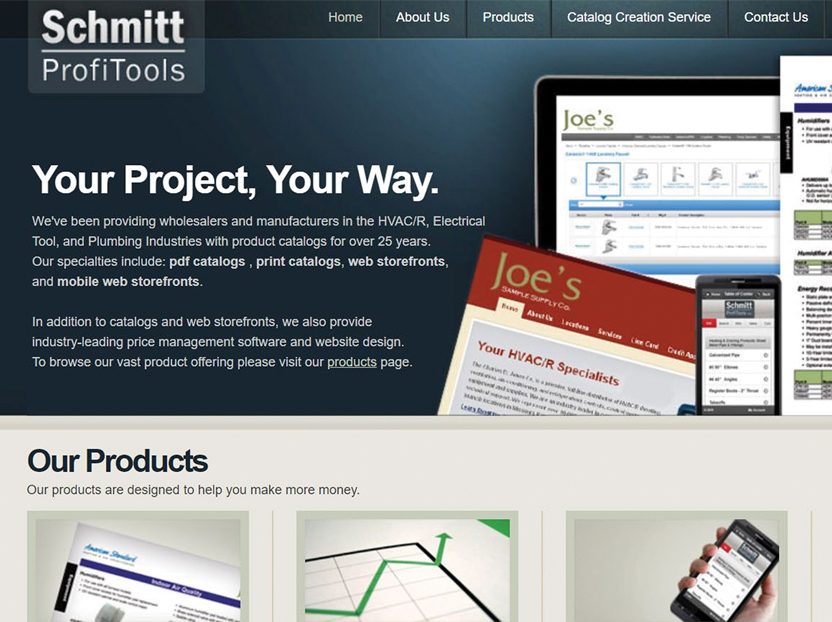A 30-Year Legacy
Rich and Jen talk about three decades of service to the PHC distribution industry.

Last year marked 30 years since Schmitt ProfiTools Inc. (the webstore, content and catalog company) was incorporated. To mark this occasion, Jen Schmitt sat down to interview Rich Schmitt about how the company was founded.
Jen: Well, I’m not off to a great start. I had hoped to sit down with the CEO and co-founder of Schmitt ProfiTools Inc., Glenda Schmitt, but she told me to “talk to Dad.” Many people assume you are the architect of our software. How did the company really get started?
Rich gives Jen a look it’s best not to describe.
Rich: My dad, Joe Schmitt Sr., had been consulting in the hard-goods industry for years. He was conducting profit improvement seminars that encouraged wholesalers to micromanage pricing, create product catalogs to promote all the products they had for sale and to relentlessly promote themselves to their target prospects and customers.
The techniques worked brilliantly for those wholesalers who adopted them. People loved the seminars but sadly went home and continued to operate pretty much the way they had before.
Jen: Seems as if making more money would be a pretty good incentive. What was the problem?
Rich: There were two challenges with the techniques. First, the pricing management often involved lowering pricing on highly price-sensitive items while raising prices on less-sensitive items. Most wholesalers resisted the process, concerned they might accidentally create pricing that would make less money. (For the record, our first rule of price changes is always to make more money. If you forecast making less money, don’t make the change; keep the status quo.)
It became clear that wholesalers needed a way to apply their modified pricing to anticipated sales volumes to verify that the new pricing would, mathematically, make more money. We now call this price modeling or performing a “what if.” Without a way to confidently forecast their results, wholesalers were reluctant to change.
Jen: You said two challenges; what was the second?
Rich: The price management and catalog creation tasks were an extremely labor-intensive process that often took years to complete. Seminar attendees would often say, “I want to do what you recommend but just don’t have the staff and energy.” One very happy adopter-wholesaler confided that he had moved his gross margin up more than five points but had dedicated five full-time people to the tasks. His plea was, “Give me some tools to make it easier.”
Jen: What happened next?
Rich: It was great timing. The PC was now becoming a force in business and Glenda had left her programming position at McDonnell Douglas to start our family. Dad asked her to look for a program he could recommend to his clients. When her search came up empty, he asked if she might write a “little program” to help his clients.
Jen: I’m sure it helped that I was an amazing baby so she had some free time.
Rich: It was a while ago and you were our first child but I have two vivid memories: First that you seemed to be lulled to sleep by the then state-of-the-art and extremely loud dot matrix printer, and second, how you were able to turn 6 oz. of baby food into 2 lb. of diaper contents.
Jen: Uh, thanks. I guess it’s no wonder I am a sound sleeper. So, when did you get involved?
Rich: When the project started, I was general manager of a division of McDonnell Douglas’ Information Systems Group. We provided hosting services to major companies and government clients. It was a demanding job, but from the start, Glenda and I would work in the evenings on the “little program.”
In 1990, I resigned that position to come back to the industry. I had worked as a consultant while at McDonnell Douglas and wanted to join Dad doing consulting in this industry. We decided to focus on the software. Probably the most important thing for me was that I wanted to work with people I liked and to spend more time with the family. Large corporations are often all-consuming, and I didn’t like that part of the job. One of the great things about our industry and owning SPI is the family focus.
Jen: I remember some real humble beginnings.
Rich: That’s for sure. We were operating out of our spare bedroom at the start. When your brother was born, we moved to an office in the basement. When we hired our first employee, we decided we needed to take a leap of faith to lease some office space to support our aggressive growth plan. It was scary and fun.
Jen: Tell me about version 1.0.
Rich: I think we launched the first version around 1990. It ran on PCDOS and we had a comprehensive, 30-page manual that explained everything. Since then, we have continued to evolve the software by moving it to Windows and adding a lot of functionality. Last time I looked at the line count of the codebase, it is more than 6 million lines of computer code. So much for a “little program.”
Jen: If you could highlight one thing the company has done over the years that you are especially proud of, what would it be?
Rich: That’s easy. We have created a lot of cool innovations and done some really interesting things, but mostly we have listened carefully to our customers. They always know what they need and want better than we do. Most of the best features of the software haven’t come from Glenda, our dedicated team or me. Our strength is that we have listened, suppressed the “programmer knows best” reflex, trusted our users’ understanding of their needs and then implemented it as well as we knew how.
Our customers also have been the driving force for our strategic direction. After customers had their pricing strategy solidified, the next objective was to provide that pricing to their customers. Thirty years ago, it was in the form of printed catalogs. After a while, customers started requesting a way to provide pricing electronically. The evolution took us through a CD-ROM catalog/quoting system, Palm-based handheld solutions to the best-in-market e-commerce and mobile solutions we provide today.
Jen: We have a pretty narrow niche. What made you guys focus on this industry?
Rich: Your great-grandfather, R. R. Schmitt, was a master plumber who opened a plumbing shop more than 100 years ago in West Newton, Pa. Your grandfather was planning to follow in the family footsteps, as was the practice in those days. Back then, if your father was a trade plumber, the odds were that you would follow in the family trade. He was an apprentice plumber when he enlisted in the Navy at the outbreak of World War II.
The Navy tested all recruits and saw his potential to be an officer. They sent him to officer training school, which included Harvard and the University of Pennsylvania’s Wharton School. After World War II, he came back home wanting to stay in the industry, but like a lot of guys, he had a more worldly, expanded vision of his role in the industry.
He started in manufacturing and wholesaling before he ultimately found his dream job, consulting in the industry. While the processes and software can be applied to many industries, this is the industry our family knows best.
Jen: Before SPI, the only thing I remember about you is that you were tired all the time and when you weren’t tired you were gone. When you joined Mom, you were tired but it was different somehow. You traveled but you were able to work around all my endless school activities and be there when my brother Joe or I needed you. I’m grateful I can do it for my kids, too.
Tell me about some of your favorite moments.
Rich: I know you feel this way, too, but my greatest personal joy is in celebrating our customers’ successes. Such as when a customer tells me he doesn’t want to talk to me at a trade show because he doesn’t want his competitors to figure out he is using our software. Or when a next-generation family member finds success with our Truckstock product in cultivating expanded relationships with their dealers and becoming an ambassador for the solution. I have “proud fatherly moments” when that happens.
Jen: Have you had any of those “proud fatherly moments” with me?
Rich: Not that I can recall.
Jen: Gee, thanks.
Rich: There are two things I would highlight: First, from when you were quite young, maybe 12 years old, you saw that it is a great industry playing a vital role in society. As I have said before, no other country enjoys the safe and effective water, sewer and gas infrastructure that we do. The industry should be very proud of its role in our country’s prosperity. You got it from the get-go: Working with people I like is important to me, but working with people you love is the best.
Second, and even more important, whenever I attend an industry function, people ask me where Jen is. While some might be offended or hurt, it is one of the best feelings I get knowing that you have earned the respect of so many others in the industry. I know many other fathers and mothers share this feeling as their “next generation” assumes significant roles in their companies and the industry.
Jen: I’m getting a little misty over here.
I hope our readers have enjoyed a look into Schmitt ProfiTools. I know that I enjoy working with my dad and hope other “kids” who choose to join our industry have the opportunity to develop a special bond with their family members that we have. Next month, it’s back to our regularly scheduled programming.





